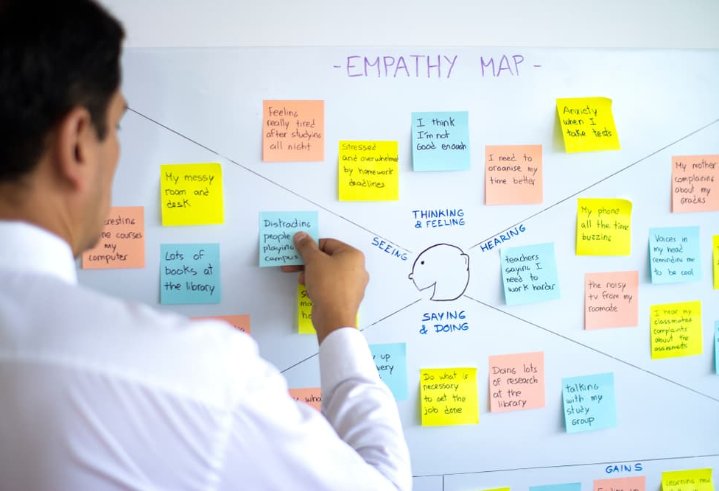Why empathy may be the most important business skill

We’ll oftentimes find ourselves faced with differing opinions, clashing work styles, and less-than-compatible personalities in the business world. It’s during these moments when an underrated, yet crucial soft skill is typically required: empathy.
“Empathy” is the act of understanding and allowing oneself to share the experiences and emotions of another. The ability has increasingly topped lists of “in-demand soft skills” among managers and business leaders; shining light on just how important it is for overall workplace synergy and productivity.
In fact, in a study released by the Chief Strategy Officer at Businesssolver, Rae Shanahan – nine out of 10 CEOs, HR professionals, and general employees valued empathy as a critical component of healthy organisations (particularly in respect to improving worker mental health).
So, what are the specific business benefits of empathy? SkillsTalk dive into these advantages below, and how managers can foster a more empathetic workplace.
Empathy boosts collaboration
It’s important to note that empathy isn’t just reliant on understanding one’s negative emotions – but sharing in one’s positive experiences, as well. In fact, studies have found that romantic partners who exhibit “positive empathy” reported having five times higher relationship satisfaction than those who simply empathised with negative experiences.
The ability to express this “positive empathy” also lent to greater life satisfaction overall – boosting the mental states of all recipients through an effect researchers termed the, “Crossover Capitalisation”.
Empathy enables workers to acknowledge each other’s achievements; build trusting, loyal connections; and support one another towards shared goals. These interactions, as a result, form a greater sense of collaboration in the workplace, and the “crossover capitalisation” effect lends to higher employee happiness overall.
Additionally, with the ability to better understand another's feelings and motivations – empathy allows for more effective workplace negotiations. By truly grasping the priorities of other colleagues, workers can more constructively compromise on solutions. An empathetic mindset allows for more honest, open communication – where workers can ask questions, engage in direct feedback, and support each other in their objectives.
Empathy increases productivity and competitive edge

In fact, a 2017 Google study named “Project Aristotle” found that their most important ideas came from teams who exhibited higher rates of generosity, curiosity, and equality towards one another’s ideas; who showed higher levels of empathy and emotional intelligence.
This allows your company to form a sharper competitive edge on the market, fuelled by productive teams of valued creativity. In a survey by The Empathy Business, the top 10 most empathetic workplaces generated 50% more earnings than those in the bottom 10. Through a workplace culture of healthier, more understanding and respectful communications – employees can work more effectively to keep their company ahead of the curve.
Empathy also allows leaders to recognise mistakes and course-correct as necessary. The skill helps them better understand the source of common issues, allowing them to deal with or eliminate them as fast and as effectively as possible.
Empathy leads to customer satisfaction
With the boost of productivity and collaboration it provides, empathy also lends itself to better product delivery and greater customer satisfaction.
Empathy allows both workers and business leaders to better understand the needs and demands of their market, helping them develop the best products and services possible. Taking the time to listen and understand customer feedback can also help them make further improvements and generate more innovative ideas.
In an article for the Harvard Business Review, James Allworth shares how tech moguls like Sony’s Akio Morito and Apple’s Steve Jobs never “commission[ed] market research,” but rather took the time to understand the behaviour, activities, and interests of their target market. Using empathy, they “put themselves in the shoes of their customers”.
Failing to do this can risk lagging your business behind; while companies who do make the effort of connecting with consumers find themselves leading the market race (i.e. Netflix’s disruption of the movie rental market).
At a department level, empathy allows your customer service and sales teams to better assist with customer concerns or inquiries. With the ability to truly understand what the other party needs, one can tailor their solutions to meet these demands as best as possible. Better customer service leads to loyal, repeat customers, lending to increased growth for your business.
Empathy leads to employee satisfaction

Success is often achieved through the combined efforts of many, rather than the isolated attempts of one. Reliance on supportive, collaborative workplace relationships are thus inevitable in business, and require empathy in order to thrive. By having these healthy connections in the workplace, employees can enjoy a stable support network and solid rapport with one another – a key factor of high job satisfaction.
In the same empathy-focused study Businessolver, over 90% of workers surveyed believed employers who prioritised mental health were more likely to retain employee satisfaction and engagement. The ability to properly manage relationships, maintain open communication, and minimise negative workplace attitudes and conflict is typically key to fostering better mental health among employees; and is often best learned through an empathetic perspective.
How to exercise empathy as a leader
Now that we’ve laid out the importance of business empathy – how does one master the skill as a manager?
A top tip offered by experts is actively listening and taking an interest in what people have to say. Along with their words, focus on their facial expressions and body language; absorbing their points, arguments, or concerns while attempting to truly see things from their point of view.
Your workers (or colleagues) will feel heard and respected for their opinions, and as a result – feel more engaged in their work and your company. Hearing out and encouraging worker feedback can also open you up to new, unique ideas you may have otherwise missed out on.
Secondly, avoid assumptions. If anything, assume good intentions as you enter a discussion or conversation – as this allows for more cooperative, positive communication. Approaching issues with blame, shame, or instant disagreement can often escalate conflict; rather than forming productive solutions through empathetic interaction.
Thirdly, be sure to not only empathise with negative experiences – but with the positive ones, too. As mentioned, positive empathy leads to a boost in general happiness for everyone involved, leading to a more satisfied and productive workplace. Celebrate wins of every size, as this helps in keeping up workplace morale and engagement.
The rewards needn’t be fancy either – achievements can be celebrated through team drinks, a pizza delivery, or simple, public acknowledgement of one’s efforts.
Finally, abide by the reverse-Golden Rule: do unto others as they want done unto them. By understanding the needs, values, and interests of those around you, you can effectively tailor your communication and/or leadership in ways that best benefit them. This helps you better craft methods of motivation, encouragement, and conflict resolution – fostering a more efficient, driven workplace.
Looking to step up your managerial skills?
Though a critical one, empathy is just one element in the ideal medley of leadership traits.
To build yourself a full, in-demand skillset for any managerial position – Upskilled offers a wide range of leadership and management courses to get you started. All courses are provided online, helping you study according to your personal needs and schedule.
Tap into your leadership potential, and enquire about a course today.


)
)

